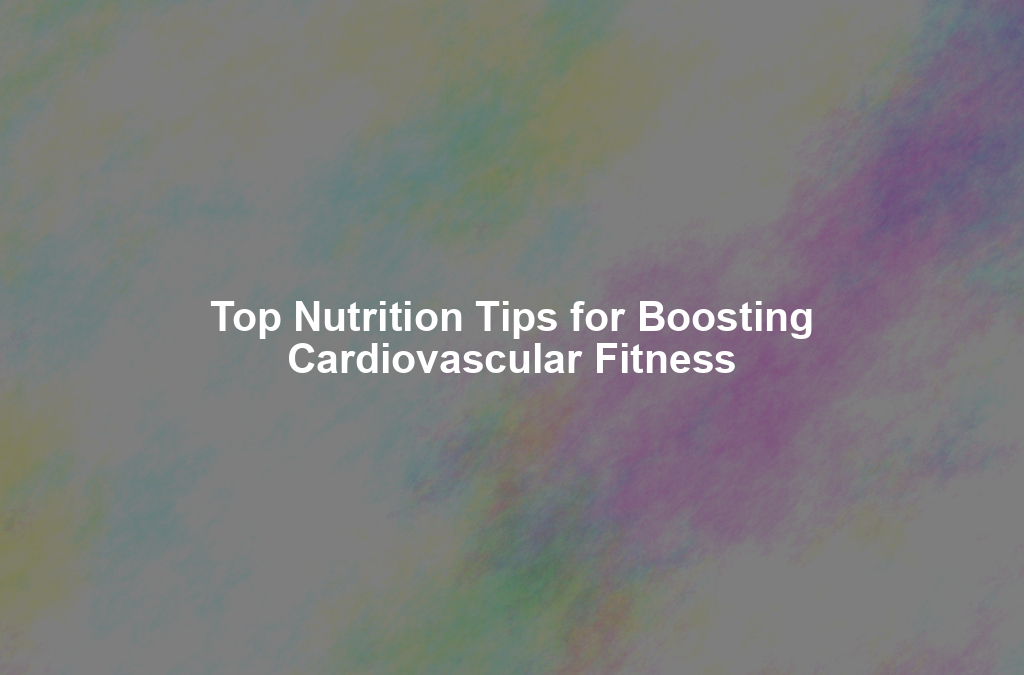
Top Nutrition Tips for Boosting Cardiovascular Fitness

Cardiovascular fitness stands as a pillar of overall health. A strong heart and efficient circulation system empower you to lead an active life. Heart disease remains the leading cause of death in the United States. Nutrition plays a pivotal role in enhancing cardiovascular health. Consuming a balanced diet can significantly reduce the risk of heart disease. You can transform your lifestyle with simple dietary changes. Discover how nutrition fuels your cardiovascular fitness: essential tips await you.
How Nutrition Fuels Your Cardiovascular Fitness: Essential Tips
Understanding Cardiovascular Fitness
What is Cardiovascular Fitness?
Cardiovascular fitness measures how well your heart, lungs, and muscles work together during exercise. This type of fitness allows you to perform physical activities for extended periods without fatigue. Improved cardiovascular fitness enhances endurance and energy levels. You can enjoy a more active lifestyle with better cardiovascular health.
Benefits of Good Cardiovascular Health
Good cardiovascular health offers numerous benefits. You can reduce the risk of heart disease and stroke. Improved blood circulation leads to better oxygen delivery throughout your body. Regular exercise strengthens your heart, making it more efficient. You can experience lower blood pressure and improved cholesterol levels. A strong cardiovascular system supports overall well-being and longevity.
How Nutrition Impacts Cardiovascular Fitness
Nutrients Essential for Heart Health
Certain nutrients play a crucial role in maintaining heart health. Omega-3 fatty acids found in fatty fish like salmon and mackerel help lower the risk of heart disease. Population-based studies show that people who regularly eat fatty fish have a lower risk of heart disease. Antioxidants in dark chocolate and tea reduce inflammation and improve heart function. Dark chocolate contains heart-healthy flavonoids that help reduce inflammation. Fiber-rich foods such as whole grains, fruits, and vegetables support heart health. These foods help manage weight and lower cholesterol levels.
Common Dietary Mistakes to Avoid
Avoiding common dietary mistakes can improve cardiovascular fitness. Consuming too much saturated fat negatively affects heart health. Research has found that saturated fat may have negative effects on heart health. Limit red meat and choose lean protein sources like poultry and legumes. Excessive sugar and salt intake can lead to high blood pressure and other heart issues. Opt for fresh, whole foods instead of processed options. Managing portion sizes helps control calorie intake and supports a healthy diet. Choose smaller plates or bowls to help regulate portions.
Essential Nutrients for Cardiovascular Health

Omega-3 Fatty Acids
Sources and Benefits
Omega-3 fatty acids play a crucial role in maintaining heart health. Fatty fish like salmon, mackerel, and sardines provide rich sources of omega-3s. Walnuts and flaxseeds also offer plant-based options. These nutrients reduce inflammation and lower blood pressure. Omega-3s improve overall cardiovascular fitness by supporting heart function. A diet rich in omega-3s enhances the body’s ability to maintain healthy cholesterol levels.
Recommended Intake
Incorporating omega-3s into your diet requires attention to intake levels. Experts recommend consuming two servings of fatty fish per week. This ensures adequate omega-3 levels for optimal heart health. Plant-based sources should complement fish intake for variety. Supplements can serve as an alternative if dietary sources are insufficient. Consulting a healthcare provider helps determine the right balance for individual needs.
Fiber
Types of Fiber
Fiber comes in two main types: soluble and insoluble. Soluble fiber dissolves in water and forms a gel-like substance. Oats, beans, and apples provide excellent sources of soluble fiber. Insoluble fiber adds bulk to stool and aids digestion. Whole grains, nuts, and vegetables offer rich sources of insoluble fiber. Both types contribute to a balanced diet and support cardiovascular fitness.
How Fiber Supports Heart Health
Fiber plays a significant role in promoting heart health. Soluble fiber helps lower cholesterol levels by binding to cholesterol particles. This process reduces the risk of heart disease and supports cardiovascular fitness. Insoluble fiber promotes regular bowel movements and prevents constipation. A diet high in fiber aids in weight management and reduces inflammation. Improved diet quality leads to enhanced physical fitness levels.
Antioxidants
Key Antioxidant-Rich Foods
Antioxidants protect the body from oxidative stress and inflammation. Berries, dark chocolate, and green tea provide abundant sources of antioxidants. Leafy greens and nuts also contribute to antioxidant intake. These foods enhance cardiovascular fitness by reducing damage to blood vessels. A diet rich in antioxidants supports overall heart health and vitality.
Role in Reducing Inflammation
Antioxidants play a vital role in reducing inflammation within the body. Inflammation contributes to heart disease and other chronic conditions. Consuming antioxidant-rich foods helps combat this issue. A heart-healthy diet focusing on plant-based foods improves physical fitness. Antioxidants work to neutralize free radicals and protect cells. This process supports a strong cardiovascular system and enhances longevity.
Practical Nutrition Tips
Meal Planning for Heart Health
Balanced Diet Components
A balanced diet forms the foundation of cardiovascular fitness. Focus on whole, minimally processed foods. Vegetables, fruits, and whole grains should fill most of your plate. Include lean proteins like chicken and fish. Choose healthy fats such as those found in nuts and avocados. Avoid trans fats and limit saturated fats. A heart-healthy diet supports overall well-being.
Sample Meal Ideas
Creating heart-friendly meals can be simple. Start your day with oatmeal topped with berries and almonds. Enjoy a lunch of grilled salmon with quinoa and steamed broccoli. For dinner, try a stir-fry with tofu, colorful vegetables, and brown rice. Snacks can include apple slices with peanut butter or a handful of walnuts. These meals provide essential nutrients for cardiovascular health.
Incorporating Heart-Healthy Foods
Easy Swaps and Additions
Small changes make a big difference. Swap white bread for whole grain options. Replace red meat with plant-based proteins like beans and lentils. Use olive oil instead of butter for cooking. Add leafy greens to sandwiches and smoothies. These swaps enhance your diet without sacrificing flavor. Heart-healthy foods boost cardiovascular fitness.
Tips for Eating Out
Eating out requires mindful choices. Choose grilled or baked options over fried foods. Request dressings and sauces on the side. Opt for water or unsweetened tea instead of sugary drinks. Share desserts to manage portion sizes. Restaurants often offer healthier alternatives. Making smart decisions fuels your cardiovascular fitness.
Staying Hydrated
Importance of Water for Cardiovascular Health
Water plays a crucial role in maintaining heart health. Proper hydration supports blood circulation. Water helps regulate body temperature during exercise. Staying hydrated prevents fatigue and enhances performance. A well-hydrated body functions more efficiently. Prioritizing water intake boosts cardiovascular fitness.
How to Ensure Adequate Hydration
Ensuring adequate hydration involves simple steps. Carry a reusable water bottle throughout the day. Drink a glass of water before each meal. Monitor urine color to gauge hydration levels. Include hydrating foods like cucumbers and watermelon in your diet. Consistent hydration supports cardiovascular health and overall wellness.
Embrace the power of nutrition to enhance your cardiovascular fitness. Prioritize whole foods like vegetables, fruits, and whole grains. Incorporate omega-3 fatty acids and antioxidants into your meals. Avoid common dietary pitfalls by choosing lean proteins and managing portion sizes. Implement these changes to transform your heart health.
Michael, a nutrition expert, emphasizes the importance of understanding whole foods and nutrients. Clients have experienced improved health and well-being through his guidance.
Start your journey today. Explore further resources and take control of your heart health. Your future self will thank you.


